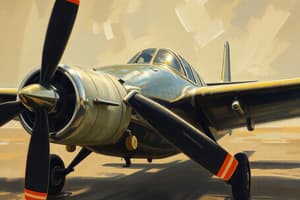Podcast
Questions and Answers
What are nose gear shock struts often equipped with to control oscillations?
What are nose gear shock struts often equipped with to control oscillations?
- External shimmy dampers (correct)
- Pneumatic springs
- Internal shimmy dampers
- Hydraulic brakes
What is the purpose of the locking or disconnect pin in some nose gear struts?
What is the purpose of the locking or disconnect pin in some nose gear struts?
- For quick turning during towing or positioning (correct)
- To control tire pressure
- To adjust shock absorption
- To regulate fluid flow
What is crucial to follow for the correct maintenance of shock struts?
What is crucial to follow for the correct maintenance of shock struts?
- The color of the shock strut
- The size of the jacking points
- The instruction plate for the correct type of hydraulic fluid and pressure (correct)
- The number of towing lugs
What controls fluid movement during compression and extension in shock struts?
What controls fluid movement during compression and extension in shock struts?
What is involved in the procedure for servicing shock struts?
What is involved in the procedure for servicing shock struts?
Flashcards are hidden until you start studying
Study Notes
Aircraft Nose Gear Shock Strut Operation and Servicing
- Nose gear shock struts often have attachments for external shimmy dampers to control oscillations.
- Some nose gear struts are equipped with a locking or disconnect pin for quick turning during towing or positioning.
- Nose and main gear shock struts on aircraft are equipped with jacking points and towing lugs for maintenance and towing.
- Shock struts contain an instruction plate near the filler inlet and air valve assembly for filling with fluid and inflating.
- It is crucial to follow the instruction plate for the correct type of hydraulic fluid and pressure for inflating the strut.
- The inner construction of a shock strut involves fluid movement during compression and extension, controlled by a metering pin.
- The compression stroke begins as the aircraft wheels touch the ground, with the strut compressing and the metering pin controlling fluid flow.
- During taxi operations, the air in the tires and the strut combine to smooth out bumps.
- Insufficient fluid or air in the strut can cause the compression stroke to not be properly limited, resulting in impact forces.
- Efficient operation of the shock struts requires proper maintenance of fluid and air pressure, including deflating and servicing the strut.
- Two common types of high-pressure strut servicing valves are the AN6287-1 valve rated to 3,000 psi and the MS28889-1 valve rated to 5,000 psi.
- The procedure for servicing shock struts involves positioning the aircraft, checking the swivel nut, and depressurizing the valve core if present before deflating and servicing the strut.
Studying That Suits You
Use AI to generate personalized quizzes and flashcards to suit your learning preferences.




